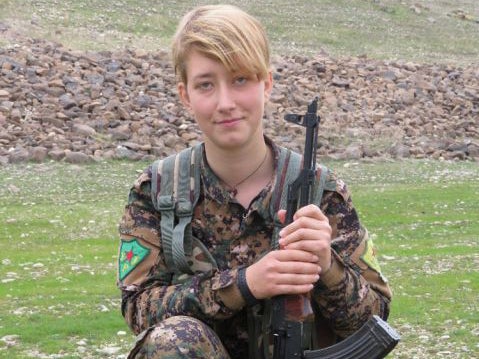I fought with the YPG and I'm upset by the patronising reaction to Anna Campbell's death
I have been called a ‘psycho’ and accused of having a death wish, but I have never been told that, like Anna who fought for the YPJ, my actions were naive

Your support helps us to tell the story
From reproductive rights to climate change to Big Tech, The Independent is on the ground when the story is developing. Whether it's investigating the financials of Elon Musk's pro-Trump PAC or producing our latest documentary, 'The A Word', which shines a light on the American women fighting for reproductive rights, we know how important it is to parse out the facts from the messaging.
At such a critical moment in US history, we need reporters on the ground. Your donation allows us to keep sending journalists to speak to both sides of the story.
The Independent is trusted by Americans across the entire political spectrum. And unlike many other quality news outlets, we choose not to lock Americans out of our reporting and analysis with paywalls. We believe quality journalism should be available to everyone, paid for by those who can afford it.
Your support makes all the difference.Last week, 26-year-old Anna Campbell was killed in Rojava, Syria, by advancing Turkish troops or their allied forces. She is the first British woman to die fighting for the YPJ; a feminist, all-woman army established by Kurds in Northern Syria which helped defeat Isis in Kobane, Manbij and Raqqa.
Before arriving in Syria she had been an animal rights, migrant rights and environmental activist. It is no wonder that she was drawn to the Rojava revolution – since gaining autonomy in 2012 from Syria this region has espoused a broad programme of ecology, direct democracy, feminism and anti-capitalism. It was for these very reasons that, like Anna, I joined the YPG (the YPJ’s male equivalent).
Anna and I were involved with the Movement for a Democratic Society (known as Tev-Dem), a coalition of groups governing Rojava. Through a complex system of “communes”, Tev-Dem offers simple solutions to ethnic and gender oppression. Rather than be victims of majority voting, ethnic and religious minorities have guaranteed representation in the local communes: 100 Syriac Christians have as much say as 1000 Sunni Arabs, for instance.
Gender oppression is met with more straightforward solutions – all positions must have “co-chairs”: one man and one woman. Polygamy is now banned and domestic violence has been made a specific offence, overseen by an all-women police force and women-only houses which act as both a refuge and organising base. Campbell worked to establish the international commune for foreigners to learn about this new way of organising society through direct engagement with it. Camaraderie transcended language barriers. As soon as a Kurd knew you were a soresgeri – a revolutionary – they would welcome you like a long-lost relative.
In Rojava the front line was never far away, and all international volunteers were issued with a Kalashnikov rifle and two grenades. Anna took part in what was meant to be the final blows to Isis following the fall of Raqqa, chasing them into Deir Ezzor. But in January 2018 the Turkish invasion began, and Anna took her place in the YPJ’s defence of Afrin – where she was killed by opposition forces.
The reaction to her death, whether or not you agree with her political motivations for being out there, has been disrespectful towards everything she stood for as a feminist. Her death was called “futile” and “naive” by some parts of the British press. While men can be soldiers for an organisation like the YPG without having patronising judgements cast upon them, it still seems to shock people that women fought alongside us and commanded us. I have been called a “psycho” and accused of having a death wish, but I have never been told, like Anna was, that I’d be “better off working in a refugee camp”. My right to bear arms is, apparently, guaranteed by my gender.
To my knowledge, none of the seven dead British male volunteers have had their deaths lamented as futile or naive, nor has it been suggested they were used as sacrificial lambs to garner sympathy. Even in death some men wish to deny Anna her female autonomy – one of the things the YPJ fought so hard to secure.
Like all volunteers, Campbell knew exactly what she was doing and why. A YPJ comrade remembers: “The day before she went to Afrin she said, ‘I’m not looking to die, but if it’s necessary to die in this struggle then I’m ready. I’m proud to die.’”
Anna Campbell’s death is appalling and enraging, but it was her decision, like many people who fight for their own political causes across the world. We owe it to her memory and her fight for gender equality not to belittle her in death.
Join our commenting forum
Join thought-provoking conversations, follow other Independent readers and see their replies
Comments